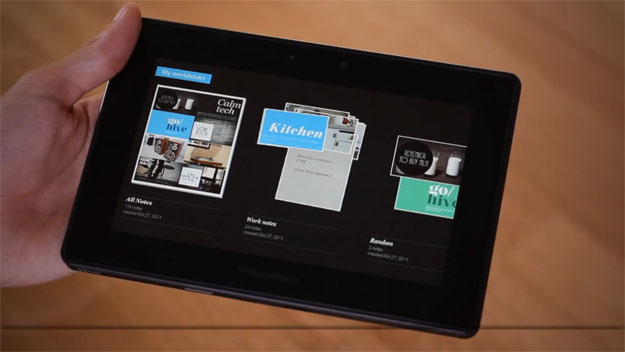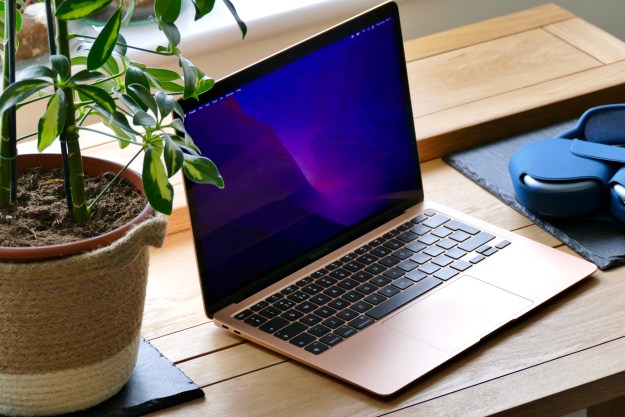
At its BlackBerry DevCon Americas conference in San Francisco, Canada’s Research in Motion officially announced BBX, an new single operating system RIM says will run on all its hardware platforms: smartphones, tablets, and embedded systems. RIM is touting BBX as combining the best elements of its existing BlackBerry OS with the best of QNX (which powers the PlayBook tablet), combined with cloud service capabilities and an emphasis on high-performance HTML5 development. DevCon being a developer conference, RIM also rolled out a bunch of tools for BlackBerry developers, including the BlackBerry Runtime for Android apps on the PlayBook as part of a beta of PlayBook OS 2.0. The upshot is that PlayBook users may soon begin to tap into the very large (and fast-growing) world of Android apps.
What is BBX, how is it distinct from RIM’s previous operating systems, and — perhaps most importantly — will it help RIM recover market share and profits lost to the likes of Android and Apple’s iOS?
BBX in a nutshell
RIM describes BBX as a combination of RIM’s existing BlackBerry OS with QNX, but BBX will not be some cobbled-together Frankenstein hybrid OS: BBX is being built exclusively on QNX. The main distinctions between BBX and RIM’s previous QNX effort is that RIM is pitching BBX as a single development platform that will power all BlackBerry devices, rather than the separate operating systems the company is working with now.
RIM is looking to sweeten the deal by offering ways for developers to create high-performance apps for BBX via Native SDK, along with slick interfaces via a new BlackBerry Cascade user interface framework. Developers who want to start making things that work on both today’s BlackBerry devices and future BBX devices can dive into BlackBerry WebWorks, which enables developers to deploy apps built using HTML5, CSS, and JavaScript. RIM says those apps will work not just on today’s BlackBerry OS 6 and 7 devices and the BlackBerry Playbook, but also future BBX devices.

RIM’s Native SDK is interesting, because it enables developers to create multithreaded, native C and C++ applications for the existing BlackBerry PlayBook, leveraging the power of its fairly advanced hardware and graphics capabilities. Part of RIM’s emphasis here is games: Native SDK provides access to OpenGL ES 2.0 (for 3D graphics) and Open AL (for multichannel 3D audio), along with gesture input. RIM is including debug and analysis tools, along with code management via Eclipse, and RIM says “well known” game developers are bringing their engines over to Native SDK. Right now, Native SDK only targets the PlayBook, but RIM promises Native SDK apps and libraries will run on future BBX smartphones and tablets, meaning if you get your native code running on the PlayBook now, it’ll work on all BlackBerry devices later. RIM is also encouraging ports of open-source libraries to Native SDK.
Also in the works is BlackBerry Cascade, a UI framework RIM picked up with its acquisition of Sweden’s The Astonishing Tribe late last year. BlackBerry Cascade is intended to let developers create “design-centric” interfaces for their apps with 3D effects, animations, and custom layouts. The message here is that BlackBerry apps will, at least technically, be able to compete with the best pixel candy on iOS and Android. Developers will be able to get their hands on it “later this fall.”

Behind all this, RIM will be offering BlackBerry Cloud Services—and it’s not yet clear whether this is merely a reference to cloud-based services RIM currently provides to its enterprise customers, or an expansion of consumer-oriented services like email, calendaring, BBM, BlackBerry App World, and recently-launched BBM Music service—the latter of which seems off to a slow start. However, with the wide range of cloud-assisted services offered by Google — as well as Apple’s new iCloud platform — RIM will likely need to bring cloud-based services to consumers if it wants future BlackBerry devices to compete in the consumer arena. RIM also just acquired Irish cloud services outfit NewBay for $100 million, which might figure significantly into RIM’s consumer-oriented plans for the cloud.
BBX devices, including smartphones and tablets, will also include the BlackBerry Runtime for Android Apps, so BlackBerry users will also be able to tap into the broad world of
The path forward?
RIM’s keynote announcing BBX emphasized two things: HTML5 development with WebWorks, and BlackBerry as a gaming and entertainment platform. Focusing on WebWorks makes sense: it’s the one thing BlackBerry developers can use now that’ll run on existing BlackBerry 6 and 7 devices, the PlayBook, and whatever RIM has up its sleeve with future devices.
The emphasis on gaming and entertainment is an indication RIM is not ceding the consumer marketplace. BlackBerries have long been the realm of stodgy enterprises and executive briefcases, but with the PlayBook, RIM is trying to establish itself as a consumer-friendly, fun brand. RIM has had some small success in that arena with its BlackBerry Bold products, but the PlayBook has generally failed to catch on while iOS devices (the iPhone, iPad, and iPod touch) and Android products have seen huge consumer adoption. Some of that adoption is driven by entertainment and games. RIM wants to prove it can play in that arena too, both on the existing PlayBook and on forthcoming BBX devices.
However, RIM faces a chicken and egg problem with developers: Developers don’t want to invest in a platform that doesn’t have an audience, and RIM can’t build that audience without apps, content, entertainment, and (yes) even games. So RIM’s emphasis on WebWorks as a development platform developers can leverage today makes sense. RIM doesn’t currently have app sales figures that compete with Apple and Android, but its case to developers is based on revenue, not sales volume:
“With nearly 5 million BlackBerry apps downloaded daily, our customers have made BlackBerry one of the most profitable platforms for developers,” said RIM co-CEO and president Mike Lazaridis in a statement.

What’s missing?
With BBX, RIM is arguing the future is bright for the BlackBerry platform and for BlackBerry developers: apps built for BBX will be able to run on future BBX smartphones and tablets, and those apps will be able to compete toe-to-toe with iOS and Android offerings in terms of design and performance. And, yes, that means games, too.
However, so far RIM has left many questions unanswered. The company has offered no timeline for when BBX will be available to developers, let alone consumers, nor indicated whether BBX will run on existing BlackBerry 6 or 7 devices. RIM also offered no guidance on its much-anticipated QNX “superphones”—are those still coming out, or will they be held back until BBX is ready? RIM made no announcements on future PlayBooks—although it’s a good bet the PlayBook 2.0, or whatever it’s called, will be the first PlayBook with BBX. RIM did offer developers a beta of PlayBook OS 2.0 (the QNX-based operating system with RIM’s Android Runtime and Adobe Air 3.0 support) but did not reveal any timeframe for when PlayBook OS 2.0 might reach consumers and potentially breathe some life into the existing PlayBook tablet.
Overall, DevCon seems like a mixed bag for RIM. The company has successfully articulated a plan for evolving the BlackBerry platform, and given developers a roadmap for how to prepare for BBX. However, the lack of any guidance on when the BBX OS and devices that support it might arrive puts a cloud over that platform’s future, especially since Apple’s iOS 5 is already on the street, with Google’s Ice Cream Sandwich (a.k.a Android 4.0) hot on its heels.
Editors' Recommendations
- BlackBerry’s latest revival attempt crashes before launch
- A new BlackBerry with a keyboard is still on the schedule for 2022
- TCL won’t make BlackBerry phones anymore, sending the brand back into limbo


